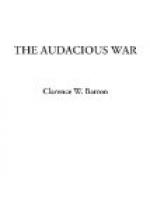Down to the ground and their graves fought the plucky little Belgians, until they numbered, not 260,000, but nearer 60,000. After every able-bodied man in Belgium was demanded by King Albert, the ranks of the Belgians began to swell, and, with able-bodied refugees returned from England, there are now about 120,000 men in the ten divisions of the Belgian army.
But England carries, as she ought, the financial burden. She feeds, clothes, and equips the Belgians and furnishes the money-supply. The Germans still strive, not so much against the Allies as against the English in Belgium. Here the fighting is fiercest, casualties are greatest, and here the reinforcements on both sides are the greatest per mile of line.
Meanwhile the more than a million Germans in Belgium have trenched across the whole country, rebuilt the forts at Namur, Liege, Antwerp, and other places, and are digging themselves into the ground doggedly and determinedly, and with as great precision and more science than the Allies. The German trenches are rather better made and the machinery for trenching has been, of course, better prepared by the Germans.
The great surprise of the war was the demonstration in Belgium that forts costing millions, in defense of cities, are absolutely useless against the big German shells. The defense at Liege was prolonged because the Germans could not at first find the exact location of the central defense. Finally a German approached bearing a large white flag of truce. Belgian orders were given to receive him. The German, under his flag of truce, signalled the desired information and then fell. Soon after, fell the fort. The Germans had found the desired range, and shot. At Antwerp a single shell was able to put an entire fortress out of business.
It is the Landwehr and the older men that have been called by Germany to do duty in Belgium, while the younger troops are sent back and forth between the eastern and western frontier defences.
An American who has lately been all through Belgium, representing both commercial interests and charity work, tells me;—
“I left America absolutely neutral. I was not a student of the war or of the cause of the war. What I saw in Belgium convinced me that the Allies must win and will win. I am no longer neutral. What I saw in Belgium of the wanton destruction of villages, towns, and cities has prejudiced me as no argument could have done. The Allies’ losses will begin when they take the offensive against the German works which are now being constructed. Soon England will have 600,000 more men on the Continent and there will be more doing.
“The losses of the Germans have been two or three times the losses of the Allies in the Belgian trenches, because the Germans have been the attacking parties. If the Allies become the attacking parties they will have to sustain the heavy losses. But I cannot see it otherwise than that the Allies must win. The crime against Belgium is the greatest crime since Calvary, and it has set the whole world against Germany.




